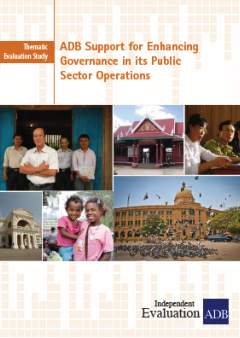
ADB Support for Enhancing Governance in its Public Sector Operations
Rapid economic growth in the Asia and Pacific region has lifted millions out of poverty, but can no longer be pursued at any cost, given the increasingly visible fallout from social and political exclusion, rising inequality, environmental degradation and climate change. Adjustments are needed to aim for a triple bottom line of growth with inclusion and sustainability.
There is no universal strategy for seeking the triple bottom line, but addressing governance challenges underlies approaches to be pursued. Achieving higher development dividends from growth will require a transformation in the quality of governance in countries—and for most this will be an arduous undertaking in view of the often conflicting goals and interests surrounding governance reforms and their inherently long term nature.
The region's governance performance is not in line with its economic growth performance. Global indicators suggest weakness in several governance dimensions in the region. ADB's stakeholder surveys consistently point to poor governance and corruption as top developmental concerns. Poor public services, weak institutions, and corruption scandals continue to plague the region, holding countries and their citizens back from realizing their full potential.
ADB's support for enhancing governance, through both its public sector management operations and its support in core operational areas, will remain vital. While its experience demonstrates the difficult and high-risk nature of governance operations, the record shows steadily improving performance and many examples of high-impact programs and projects.
The evaluation stresses the need for ADB's continued governance support, for development effectiveness in the region and in serving its mission. Achieving better results will require improvements in direction, diagnostics, and delivery. ADB would want to improve its country- and sector-level governance related diagnostics, sharpen its corporate-level guidance for crosscutting public sector management oriented operations, and design and deliver interventions that carefully consider the countries' governance contexts, public sector management capacities, and political commitment.
The evaluation acknowledges the tough challenge inherent in working on governance and getting good results from it, but highlights the potential payoffs of deeper efforts made.
Contents
- Acknowledgments
- Foreword
- Executive Summary and Recommendations
- Chapter 1: Introduction
- Chapter 2: Governance, Development, and Asia's Challenge
- Chapter 3: The Governance Agenda
- Chapter 4: Public Sector Management Operations
- Chapter 5: Support for Enhancing Sector Governance
- Chapter 6: GACAP II Review
- Appendixes
